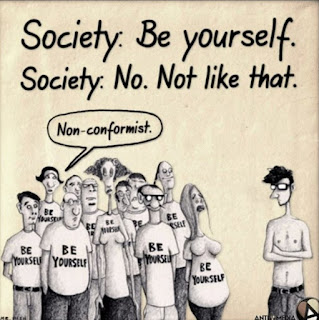This is America
America is known for its iconic “American Dream” but knowing when one has achieved the American Dream is a different story. Success in America is not measured by personal happiness or by growth but instead by material wealth. When people see someone as “successful,” the person may have a big house or nice cars which leads to the perception of success and success is the goal of the American Dream. Material wealth is America.
Gatsby would be considered nothing to others without his material wealth. When Daisy meets Gatsby for the first time in years and takes a tour of his house, she “bent her head into the shirts and began to cry stormily….’It makes me sad because I've never seen such— beautiful shirts before’” (92). Daisy crying “stormily” over just the look of the shirts is not the real reason for her tears. She cries because of how the shirts show Gatsby’s immense material wealth and she falls back in love with him due to his new money. This same type of material attraction is seen with the guests at Gatsby’s extravagant parties because at Gatsby’s parties, “sometimes [guests] came and went without having met Gatsby at all” (41). People don’t seem to care about the person but only about what the person has to offer them that they would not even make the effort to meet the provider of all the material things they enjoy. Without his big parties, nobody would know Gatsby’s name. When the party’s over and we can see who is really there for Gatsby. Nick tries his best to bring people to Gatsby's funeral “but it wasn’t any use. Nobody came” (174). Gatsby went from parties filled with so many people to nobody at all. Gatsby had nothing to offer people at his funeral, therefore nobody saw the need to go to it. Once materialistic goods are out of the picture, a person can see who their true friends are and for Gatsby, that true friend is Nick Carraway.
To be considered successful in America, one must be able to prove that they’ve made money through material goods. In Starfood, when Dade’s mother and father were starting their life together, Dade’s father “mentioned the idea of a grocery… I think my father must’ve seen right through the end of his life” (46). In that moment, Dade's father saw the grocery as pursuing the American dream which is working hard to get money and the way to express that to other people is with materialistic objects. In The Rich Brother, this expression of material things is seen with Pete: “he had two daughters, a sailboat, a house from which he could see a thin slice of ocean… Pete prospered and Donald did not prosper” (73-74). Even though his daughters aren’t objects of course, the way that the author talks about them makes them sound like an achievement rather than people. His daughters are followed by material things which prove how Pete is “prospering” and how his brother, Donald, is not. With Petes success, this allows him to feel superior over his brother Donald which makes Pete hand “down his judgments in ways he thought subtle…” (74) to Donald. This same behavior is seen in America where a more fortunate person feels that they have the right to judge others just based on their situation. Success, the goal of the American Dream, is measured by material wealth.

Zarine, Your main idea here is right on target and your evidence is strong. The Gatsby quotes. in particular, do a great job of showing the narrow materialism you argue. I also like the lines you chose from our stories. Pete is confident he alone has "prospered" because he does not see Donald's desire to help others as a form of "prospering." I only wish you had invoked your junior theme here to show how Americans have also used violence to attain and maintain their material wealth. Overall, though, good work!
ReplyDelete